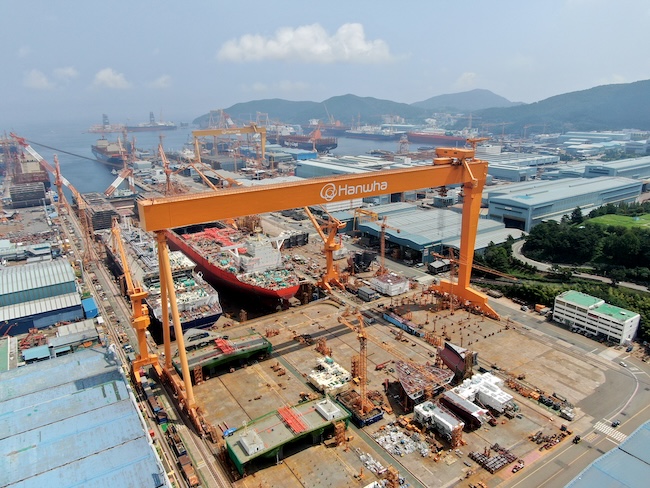
A skilled worker at Daewoo Shipbuilding & Marine Engineering’s headquarters in Geoje, South Gyeongsang Province. (Image courtesy of Yonhap)
SEOUL, Oct. 20 (Korea Bizwire) — The South Korean government will formally launch the “K-Ship Tech Alliance” next year, a sweeping initiative designed to accelerate the shipbuilding industry’s transition to artificial intelligence (AI) technologies as part of the country’s broader industrial innovation strategy.
Announced at a high-level economic ministers’ meeting chaired by Deputy Prime Minister and Finance Minister Koo Yun-cheol on Monday, the plan marks a major step in the government’s AI-led transformation of four key sectors — robotics, automobiles, shipbuilding, and drones — through a coordinated package of budgetary, tax, financial, and regulatory support.
The new alliance will bring together South Korea’s three major shipbuilders to collaborate on AI-based autonomous vessel technology, unmanned shipyard systems, R&D, and workforce training.
The government also plans to develop reliability assessment and certification systems for autonomous ships by 2032 and to explore industry incentives based on international standards and market needs.
To test AI-driven inland waterway vessels, authorities will introduce a regulatory sandbox, allowing limited exemptions from existing rules.
In the robotics sector, the government plans to expand pilot projects for AI-powered robots in industrial and public settings next year, while revising the Personal Information Protection Act to permit the use of raw data for AI and robotics R&D. A 570 billion won ($410 million) fund will also be established by year-end to support emerging AI and deep-tech “unicorn” startups.
For autonomous vehicles, Seoul will prepare a city-level demonstration plan by December to generate demand and roll out GPU support for AI-driven mobility firms starting the same month. Legislation will also be introduced to allow R&D use of raw driving footage, alongside institutional measures for licensing, traffic control, and safety management.
In the drone sector, the government will expand pilot programs for public services such as wildfire monitoring and railway inspections, while easing approval procedures for drone flights by mid-2025.
Officials said the initiatives are part of 15 national “super-innovation” projects in areas such as smart agriculture and K-bio and beauty. Twenty task forces — spanning ministries, industry, and finance agencies — will finalize detailed roadmaps by next month.
M. H. Lee (mhlee@koreabizwire.com)

